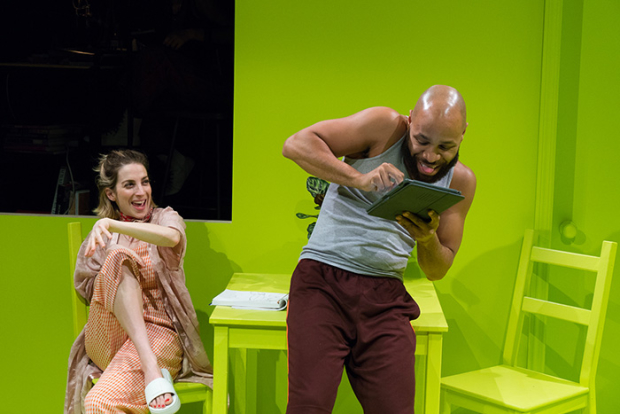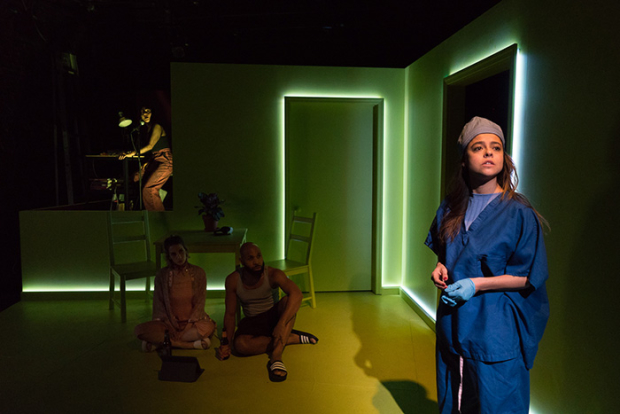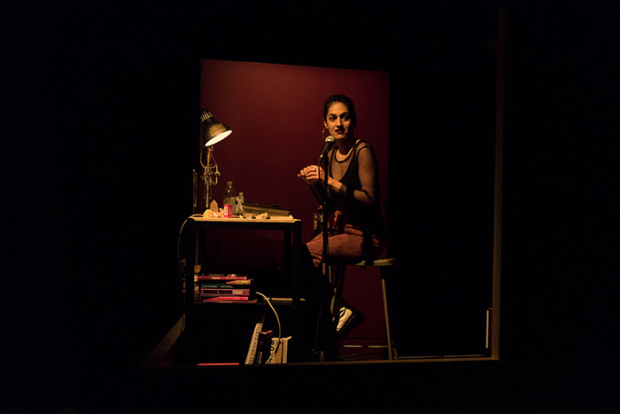House Plant Debunks the Romance of Love and Art

(© Elke Young)
House Plant, a new work by Sarah Einspanier at the Fourth Street Theatre (part of the Next Door at New York Theatre Workshop season), is full of clever insights and shrewd wit, but has a big old clunky metaphor tying it all together.
In her 90-minute one-act directed by Jaki Bradley, Einspanier dives into the nature of long-term relationships — romantic, platonic, and creative — and how they form, how they grow, and how they are nurtured (or neglected, as the case may be). The title house plant sits on a table center stage, mostly ignored, but we don't really need the presence of a forgotten shrub to see that its revolving door of caretakers are emotionally drying up as well.
Like an artist tweaking her creation, Deepali Gupta is tucked away on a perch, adding music and sound effects (designed by John Gasper) to the proceedings below (clean, minimalist set design by Meredith Ries), where we find June (Emma Ramos) and Max (Ugo Chukwu). The two have been together nearly seven years — the amount of time, according to a scientific article, it takes for all of your cells to replace themselves. Ergo, June decides she is a completely new person — one who is no longer satisfied with their couple routine of eating, having sex, and watching medical dramas. So, in one of House Plant's many fanciful moments, June flies off to Los Angeles to star in…a medical drama (prior to her spontaneous acting career, she was fielding online questions from customers of a Blue Apron-type service).

(© Elke Young)
After June moves out, her best friend Chloe (Molly Bernard) — a queer avant-garde artist in an off-and-on relationship with a musician named Agnes (Gupta) — moves in. Chloe works on a new piece while Max pursues his own creative career in the delicate art of "hold music" composition, though he quickly shifts his focus to a new project: winning back June with a blog about his make-believe ascent of a mountain in Peru. Chloe and Max begin their cohabitation as adversaries, but fall into the patterns of any other domestic partnership — sharing creative ideas, swapping thoughts on love (Chloe has a particularly compelling speech about love as a capitalist product), and of course, watching medical dramas.
Einspanier's humor is broad in its situations but specific in its dialogue, and I find the latter far more compelling than our frequent campy sojourns into the medical drama versions of reality (after her character leaves for LA, these magical vignettes unfortunately make up the majority of Ramos's material). Although to be fair, I suppose that opinion mirrors the conclusion our characters come to as well, as they all end their independent "hero's journeys" with the determination that the plateau of domesticity is preferable to fictional adventures.
Einspanier implies the same applies to art, the silly mundanity of which is highlighted from the opening scene when Gupta (suggesting that this bizarre world is Agnes's musical creation) starts spouting science gobbledygook with the conviction of an omniscient deity. Within the cast, Bernard is by far the most successful at delivering the humor, sincerity, and oddball blend of the two that Einspanier's anti-romantic artistic point of view turns on. Chloe rejects the societal formality of pairing off, values originality in her bold-bordering-on-pornographic art, and yet harbors a secret lust for tourist traps and basic white-girl brunches. Bernard lets us laugh through all of it, but we never once doubt her sincerity or the intelligence with which she holds her contradictions. That balance is the tightrope the play as a whole has to walk, and ultimately, what keeps this House Plant alive.

(© Elke Young)










